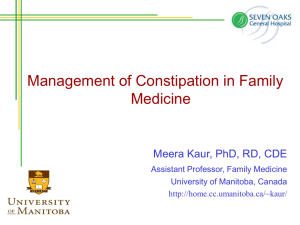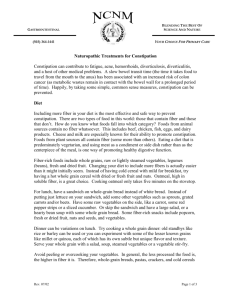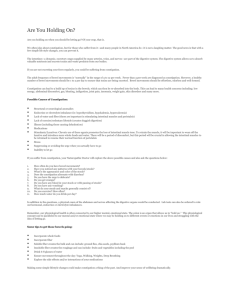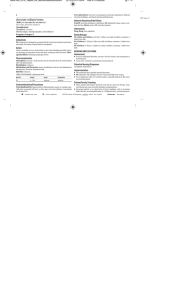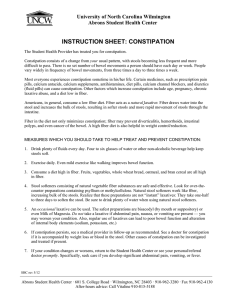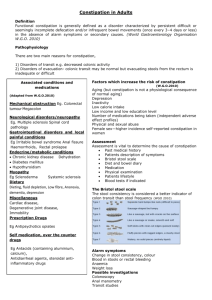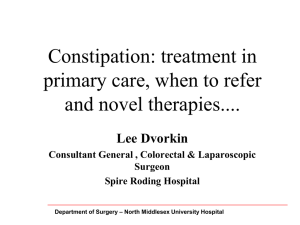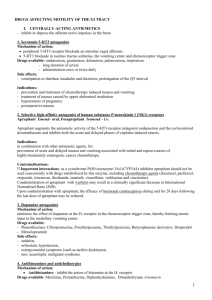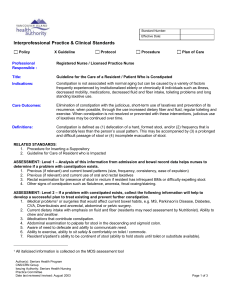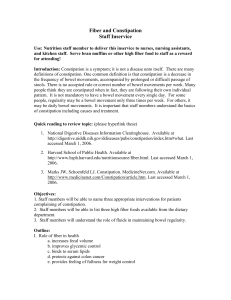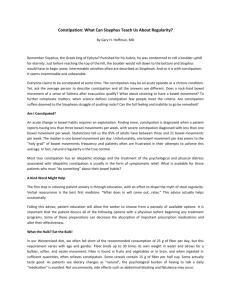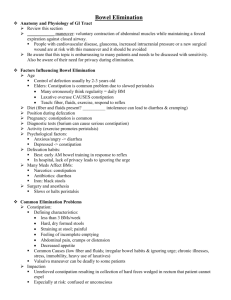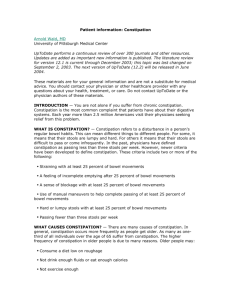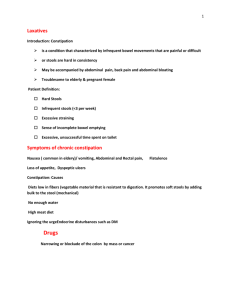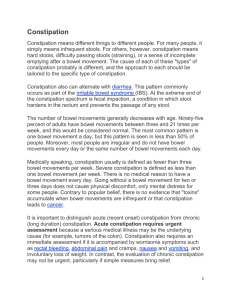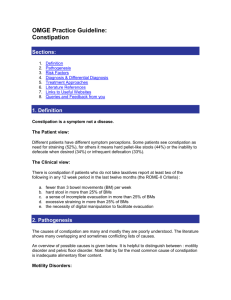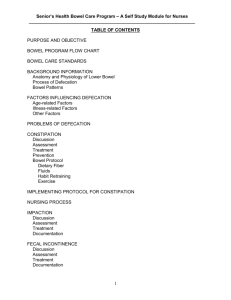Question: What laxatives or stool softeners should I use for my
advertisement
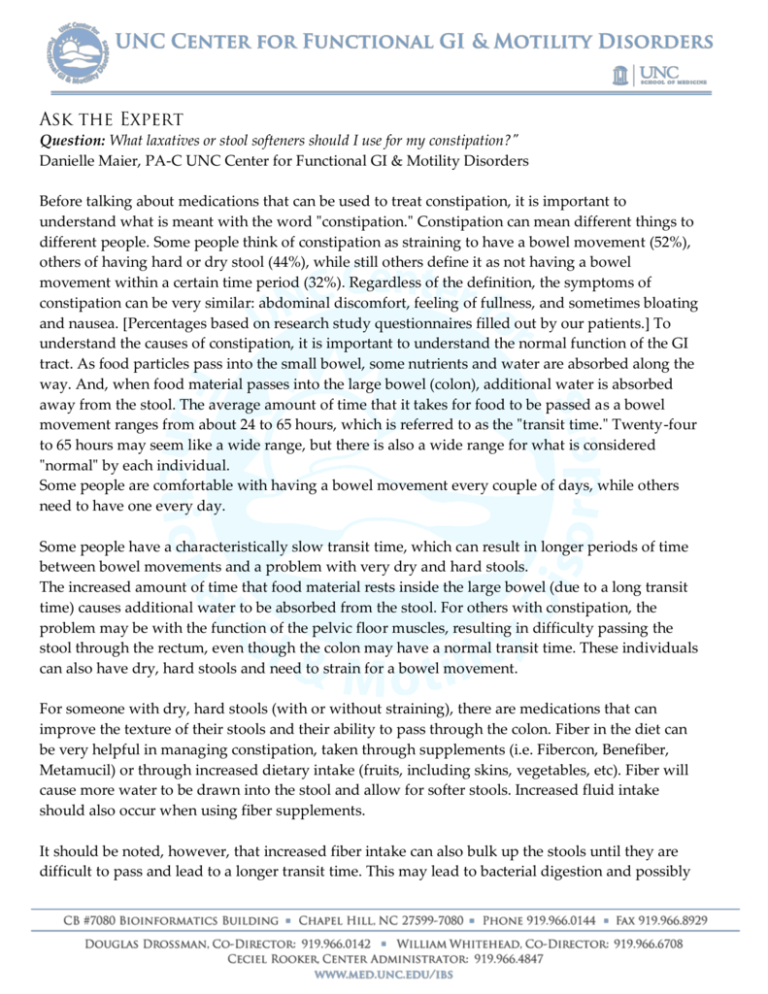
Question: What laxatives or stool softeners should I use for my constipation?" Danielle Maier, PA-C UNC Center for Functional GI & Motility Disorders Before talking about medications that can be used to treat constipation, it is important to understand what is meant with the word "constipation." Constipation can mean different things to different people. Some people think of constipation as straining to have a bowel movement (52%), others of having hard or dry stool (44%), while still others define it as not having a bowel movement within a certain time period (32%). Regardless of the definition, the symptoms of constipation can be very similar: abdominal discomfort, feeling of fullness, and sometimes bloating and nausea. [Percentages based on research study questionnaires filled out by our patients.] To understand the causes of constipation, it is important to understand the normal function of the GI tract. As food particles pass into the small bowel, some nutrients and water are absorbed along the way. And, when food material passes into the large bowel (colon), additional water is absorbed away from the stool. The average amount of time that it takes for food to be passed as a bowel movement ranges from about 24 to 65 hours, which is referred to as the "transit time." Twenty-four to 65 hours may seem like a wide range, but there is also a wide range for what is considered "normal" by each individual. Some people are comfortable with having a bowel movement every couple of days, while others need to have one every day. Some people have a characteristically slow transit time, which can result in longer periods of time between bowel movements and a problem with very dry and hard stools. The increased amount of time that food material rests inside the large bowel (due to a long transit time) causes additional water to be absorbed from the stool. For others with constipation, the problem may be with the function of the pelvic floor muscles, resulting in difficulty passing the stool through the rectum, even though the colon may have a normal transit time. These individuals can also have dry, hard stools and need to strain for a bowel movement. For someone with dry, hard stools (with or without straining), there are medications that can improve the texture of their stools and their ability to pass through the colon. Fiber in the diet can be very helpful in managing constipation, taken through supplements (i.e. Fibercon, Benefiber, Metamucil) or through increased dietary intake (fruits, including skins, vegetables, etc). Fiber will cause more water to be drawn into the stool and allow for softer stools. Increased fluid intake should also occur when using fiber supplements. It should be noted, however, that increased fiber intake can also bulk up the stools until they are difficult to pass and lead to a longer transit time. This may lead to bacterial digestion and possibly produce gaseousness and increased discomfort. Therefore, fiber intake should be increased gradually, to avoid problems with increased gas and bloating or worsening constipation. There are other laxatives that can be used to cause more water to be drawn into the stool and retained in the large bowel to produce softer stools. These are called osmotic laxatives and include Milk of Magnesia (MOM), glycerin suppositories, enemas, and a prescription called lactulose. They are generally safe for use on a regular basis but, if you have renal or heart problems, you will need to consult with your physician before taking MOM. With all osmotic laxatives, be sure that hydration is maintained through increased water intake and understand that diarrhea may occur. Fleet enemas and glycerine suppositories are also safe and effective to use, especially when used in combined with MOM or fiber. It is important to determine if they include stimulant ingredients that will be mentioned later. If so, they should only be used only occasionally and, if possible, substituted for products without stimulant ingredients as soon as possible. Enemas and suppositories can be used by themselves, but also work well when used with other agents (i.e. MOM, fiber, Miralax, etc.). Bowel preps (such as those taken before a colonoscopy) -- including Phopho-soda, Golytely, and Nulytely -- also function on the same principle of drawing water into the gut in order to soften stools and allow for easier passage. When over-the-counter preparations have not provided adequate relief, your doctor may suggest trying a prescription medication. Miralax, a powder formulation of Golytely, is the most commonly used prescription stool softener at the UNC Functional Bowel Clinic. It can be mixed in almost any liquid, is odorless and tasteless, and can be taken on a regular basis for chronic constipation. Mineral oils have also been used in the past and, although they can improve passage of hard and dry stools, they are not recommended for use by the elderly. They can also block absorption of fat soluble vitamins and should not be taken on a regular basis. Many people with constipation choose stimulant laxatives (like Correctol, Ex-Lax, or Ducolax, etc.). Although these laxatives are often effective, they can also cause long-term problems if taken more than occasionally. These laxatives often contain ingredients such as cascara, senna, danthron, and bisacodyl, which can cause cramping, dehydration, and fluid and electrolyte imbalances. Over time, more medication will be needed to achieve the same effect. With more than occasional use of these medications, the bowel can become reliant on stimulant laxatives. Therefore, they should be used only on an occasional basis and, as soon as possible, substituted with MOM, fiber, or other prescription laxatives. For the treatment of constipation, the first line medications should be readily available in your local pharmacy. Milk of magnesia and fiber supplements are the most commonly used because they are generally effective and are usually tolerated the best. Other over the counter treatments may be used, but caution is advised and your doctor should be consulted if any formulation is needed on a chronic basis. When seeing your physician, he/she may determine that a prescription medication is needed for your constipation. It is important to keep in mind that all of these medications, whether over-the-counter or prescription, can have side effects. Be sure to inform your physician if problems arise with any treatment.
